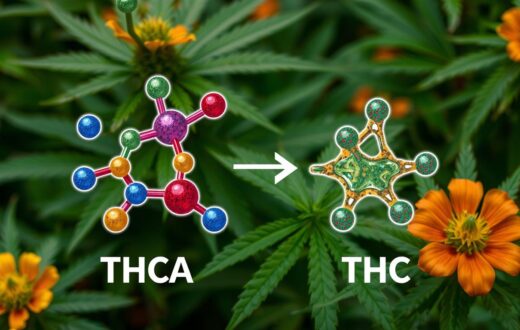Are you tired of using traditional pain meds with their many side effects? THCA, a compound in cannabis, might be a better choice. But what is THCA, and how does it help with pain?
THCA, or tetrahydrocannabinolic acid, is found in raw cannabis plants. It’s not psychoactive like THC, so it won’t make you high. It’s getting attention for its potential to help with pain.
Studies show THCA works with our body’s endocannabinoid system. It targets receptors that help control pain. This might help reduce inflammation and ease chronic pain like arthritis and fibromyalgia.
Even though research is still new, many people say THCA helps with pain. We’ll look into the science behind THCA, its benefits, and how it stacks up against regular pain meds.
Let’s explore the promise of THCA in pain relief and medical marijuana. Could this natural compound lead to a life free from pain?
Understanding THCA: The Basics
Cannabis plants have over 100 unique cannabinoids, with THCA being one of the most common. THCA, or tetrahydrocannabinolic acid, is found in raw and live plants. It’s a key compound that differs from THC.
What is THCA?
THCA is the precursor to Delta-9 THC, the main psychoactive part of cannabis. In its raw form, THCA is not psychoactive. It won’t make you feel “high” when you consume it.
This cannabinoid is known for its potential health benefits. It can help with nausea, protect the brain, and reduce inflammation.
How Does THCA Differ from THC?
The main difference between THCA and THC is their effects and chemical structure. THCA turns into THC when cannabis is heated. This process is called decarboxylation.
While THC can make you feel psychoactive, THCA does not. This is why eating raw cannabis doesn’t get you high. Both cannabinoids have benefits, but they are used differently and have different legal statuses.
Knowing about these compounds is important. It helps users find the right cannabis products for their needs.
The Science Behind THCA and Pain Relief
THCA is a compound in raw cannabis plants that helps with pain. It doesn’t make you high like THC. It works with the body’s endocannabinoid system to offer relief.
Cannabinoids and Pain Management
Cannabinoids like THCA help the body fight pain. They connect with cannabinoid receptors in the endocannabinoid system. This might lower pain signals and swelling.
THCA could help with different kinds of pain. This includes long-term pain and sudden injuries.
The Endocannabinoid System Explained
The endocannabinoid system has receptors all over the body. It controls many things, like how we feel pain. When THCA gets into the body, it talks to these receptors.
This might change how we feel pain. Keeping this system in balance is important for managing pain. THCA could be a natural way to ease pain without side effects.
Studies show THCA might also fight inflammation. This could help with pain from arthritis or muscle spasms. More research is needed, but THCA looks like a good option for pain relief.
THCA’s Anti-Inflammatory Properties
THCA is found in live cannabis plants and has anti-inflammatory benefits. It’s different from THC because of its molecular structure. This difference means it doesn’t cause psychoactive effects but might help with inflammation.
Role of Inflammation in Pain
Chronic inflammation is a big problem in many painful conditions. It’s a key player in diseases like arthritis and autoimmune disorders. This ongoing inflammation can cause long-lasting pain and lower quality of life.
How THCA Reduces Inflammation
THCA might help with chronic inflammation. It could work with the body’s CB1 and CB2 receptors in a special way. This could offer relief without the mind-altering effects of THC.
Studies show THCA could help with conditions like arthritis and inflammatory bowel disease. It might also protect the nervous system. As research goes on, THCA’s role in fighting pain and inflammation is becoming clearer. It offers hope for those with chronic pain.
THCA Versus Traditional Pain Relief Medications
Pain relief is crucial in healthcare. Many patients use opioids and nsaids to manage pain. But, these drugs have big downsides. Let’s see how THCA stacks up against them and why it’s seen as a better option.
Comparing Effectiveness
Opioids are strong but risky, leading to addiction and serious side effects. NSAIDs are less strong but can harm the stomach and liver over time. THCA, however, is a natural pain relief choice. It might be as good as opioids for some pains without the risks.
Side Effects of Conventional Pain Medications
Traditional pain meds have serious side effects. Opioids can cause addiction and breathing problems. NSAIDs might lead to stomach issues and kidney damage. THCA, being non-psychoactive, offers pain relief without the high or impairment.
Research shows THCA’s potential in pain management. It could be safer and more effective than opioids and nsaids. Patients and doctors are looking at THCA as a key part of pain treatment.
Clinical Research on THCA and Pain Relief
Cannabis research has made big steps in understanding THCA for pain relief. Recent studies have shown its non-psychoactive compound’s promising effects. Unlike THC, THCA doesn’t cause a “high,” making it a good choice for those looking for medicinal benefits without getting intoxicated.
Recent Studies and Findings
Clinical trials have found that THCA has anti-inflammatory properties. This could help with conditions like arthritis. Researchers also found that THCA might protect the brain, which is good for brain health. These discoveries have made people interested in using THCA for pain management.
Patient Experiences
Even though formal trials are still going on, patient stories give us a glimpse of THCA’s benefits. Many people say THCA helps them with chronic pain. It’s also helped some with nausea and vomiting, especially those going through chemotherapy.
As research on cannabis grows, doctors are learning more about THCA. While more human trials are needed, the current results are encouraging. They show that THCA could be a big part of future pain treatments.
Legal Status of THCA in the United States
The laws about THCA in the U.S. are complex and keep changing. As more states legalize cannabis, it’s important to understand the rules. The rules about THCA differ from state to state, making things confusing for everyone.
Understanding Cannabis Regulations
At the federal level, laws about THCA are set. The 2018 Farm Bill says hemp is cannabis with less than 0.3% delta-9 THC. This rule affects THCA because it can turn into delta-9 THC when heated. The DEA says this rule includes THCA, making its legal status unclear.
THCA and State Laws
State laws add more complexity. Some states allow THCA for medical use, while others don’t. The push for legalizing cannabis has led to different rules in each state. This means some states let you use THCA products, while others ban them.
As laws change, it’s key to know the local rules about THCA. The mix of federal and state laws will keep shaping THCA’s legal future in the U.S.
How to Use THCA for Pain Relief
THCA products are a new way to manage pain without the high of THC. Knowing how to use them and the right amount is crucial. This helps you get the most out of THCA’s benefits.
Consumption Methods for THCA
Raw cannabis leaves and juices are great for getting THCA. These methods keep THCA’s non-psychoactive benefits because they don’t use heat. Tinctures and topicals are also good for targeted relief. But, remember, heating THCA turns it into THC, changing its effects.
Recommended Dosages for Pain Management
Dosage for THCA depends on your needs and the condition. Start with a small amount and slowly increase it. For example, try a little raw cannabis in a smoothie or salad.
If using tinctures, start with a few drops under your tongue. Keep track of how much you take and how it affects you. This helps you find the best dose for you.
When using THCA for pain, talk to a healthcare professional who knows about cannabis. They can help you use THCA in your pain plan. Always be safe and follow the law in your area about using cannabis.
Combining THCA with Other Treatments
THCA is a great addition to a pain management plan. Many people see better results by mixing it with other treatments. This approach, called integrative medicine, can make pain relief more effective.
Integrating THCA into a Pain Management Plan
Start slow when adding THCA to your pain plan. Talk to your doctor about how it fits with your current treatments. Some people find that using THCA with physical therapy or acupuncture works best.
Holistic Approaches for Pain Relief
Holistic pain relief looks at the whole person, not just symptoms. Yoga, meditation, and massage can work well with THCA. These methods may help reduce stress and improve well-being.
Remember, everyone’s pain is different. What works for one person might not work for another. It’s important to track your progress and adjust your plan as needed. By combining THCA with other treatments, you might find a pain management approach that really works for you.
Potential Side Effects of THCA
THCA has many benefits, but it’s important to know its possible effects on your body. While THCA is generally safe, some people might experience side effects from cannabis.
Common Side Effects to Expect
Using THCA might make your eyes and mouth dry. You could also feel very sleepy or tired. In some cases, it might upset your stomach or cause nausea.
If you’re trying THCA for the first time, start with a small amount. This way, you can see how your body reacts.
When to Consult a Healthcare Professional
If you feel severe anxiety, a fast heartbeat, or unusual weight changes after using THCA, see a doctor. It’s crucial to talk about drug interactions if you’re on other medications. Some people might have allergic reactions, like itching or skin rashes.
The THCA market is growing quickly, but it’s not well-regulated yet. Always buy from trusted brands that test their products. This helps avoid problems from things like pesticides or heavy metals. If you’re unsure about using THCA, it’s best to check with a healthcare professional first.
Future of THCA Research and Pain Relief
Cannabis science is moving fast, opening new paths for pain treatment. Research on THCA, a non-psychoactive part of cannabis, shows great promise for pain relief. As we learn more about this cannabinoid, the chance for new therapies grows.
Emerging Studies and Innovations
Scientists are studying THCA’s anti-inflammatory effects. This could help with arthritis and fibromyalgia. A 2013 study in the Journal of Pharmacology and Experimental Therapeutics showed its benefits.
Researchers are also looking into THCA’s ability to protect nerves. This might help reduce pain severity.
Impact on Chronic Pain Patients
For millions with chronic pain, THCA offers hope. Unlike THC, THCA doesn’t cause a “high.” This makes it a good choice for daily pain management.
Vaping THCA gives quick relief and better control over dosage. This could be a big change for those looking for alternatives to traditional pain meds.
As cannabis science advances, we’ll see more targeted THCA products for pain. The future might include THCA combined with other cannabinoids or natural compounds, like mushroom blends. These new ideas could change how we manage chronic pain.
Personalizing Pain Relief with THCA
Pain management is not a one-size-fits-all approach. Each person’s pain experience is unique. This makes personalized medicine key in creating effective treatment plans. THCA, a non-psychoactive compound in cannabis, shows great promise in tailored pain relief.
Tailoring THCA Use to Individual Needs
THCA’s effectiveness can vary based on several factors. These include pain type, intensity, and individual physiology. Some people find THCA helpful for managing arthritis pain due to its anti-inflammatory properties.
Others may benefit from its potential neuroprotective qualities in treating conditions like Parkinson’s disease. Working with a healthcare provider knowledgeable in cannabis therapy can help determine the most suitable THCA application for your specific needs.
Identifying Pain Triggers for Better Management
Understanding your pain triggers is key to creating an effective pain management plan. THCA can be incorporated into various pain management techniques. This includes combining it with physical therapy or stress reduction practices.
By identifying specific triggers, you can tailor your THCA use to target pain more effectively. This personalized approach may lead to better outcomes and improved quality of life.
Remember, while THCA shows promise in pain relief, it’s essential to consult with a healthcare professional before starting any new treatment. They can help you navigate the complexities of personalized medicine. This ensures that THCA is used safely and effectively as part of your overall pain management strategy.
The Role of Medical Professionals in THCA Usage
Medical marijuana doctors are crucial in helping patients use THCA for pain relief. They provide insights on dosing, drug interactions, and legal aspects of THCA treatment. As cannabis medicine evolves, more healthcare providers are learning about THCA and other cannabinoids.
Consulting with Doctors About THCA
Talking to a doctor who knows about cannabis is essential when considering THCA for pain management. These specialists can create a plan tailored to your health needs. They consider your medical history, current medications, and pain levels to suggest the best THCA approach for you.
The Importance of Professional Guidance
Getting professional guidance is key when using THCA for pain relief. Medical professionals keep up with the latest research on cannabis treatments. They can explain how THCA is different from THC, noting that THCA doesn’t cause a “high.”
Cannabis clinics provide a safe space to explore THCA options with expert care. These centers bring together medical marijuana doctors and other healthcare providers focused on cannabis treatments. By visiting a cannabis clinic, you get a team of professionals guiding you through your THCA journey. They ensure you receive the best care for your pain management needs.
Anecdotal Evidence: Patient Success Stories
The cannabis community is buzzing with stories about THCA’s impact on pain relief. These real-life experiences give us a glimpse into how this compound helps people with chronic pain.
Real-Life Experiences with THCA
Many users have seen big improvements in their lives after using THCA. One patient said, “THCA has been a game-changer for my arthritis. I can now enjoy activities I thought were lost to me.” Another person with fibromyalgia noted, “The relief I’ve found with THCA is unlike anything I’ve tried before.”
The Community’s Perspective on Pain Relief
Pain relief stories from the cannabis community show THCA’s potential for many conditions. People with neuropathic pain say they feel better, and those with inflammatory disorders are also pleased. One user said, “THCA has given me back my life. The constant pain I lived with for years is now manageable.”
While these stories are hopeful, it’s key to remember that everyone’s experience is different. More research is needed to fully grasp THCA’s effects on pain. Always talk to a healthcare professional before trying any new treatment.
Conclusion: The Promise of THCA for Pain Management
Looking ahead, THCA shines as a beacon of hope for natural pain relief. This non-intoxicating cannabinoid is found in raw cannabis plants. It has shown great promise in addressing health concerns, including pain management.
Future Considerations for Patients
THCA’s role in pain relief is just starting to be explored. Research indicates it may help reduce nausea and stimulate appetite. It could also play a key role in easing pain and discomfort.
As studies continue, patients might find THCA-based products in their pain management plans. These could include tinctures, topicals, and raw hemp flower.
Final Thoughts on THCA and Pain Relief
THCA’s potential goes beyond just pain relief. It has neuroprotective and anti-inflammatory properties, making it a promising candidate for many therapies. Unlike Delta-9 THC, which has psychoactive effects, THCA remains non-intoxicating until heated.
This makes it a unique option for those wanting cannabis benefits without the high. As we delve deeper into the world of cannabinoids, THCA could become a key player in natural pain management and overall wellness.















